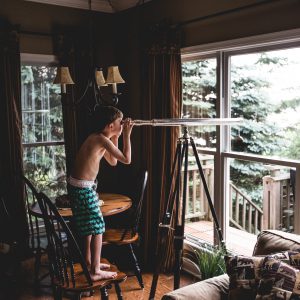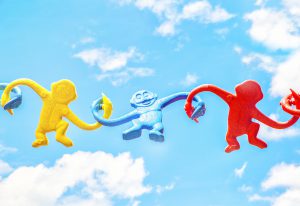The Oishii team just finished up an exciting week at Comic-Con! And while work brought us to San Diego for the usually artful cross-promotional programming, costuming and fantasy fetes, (Check out our latest promo done for TBS for Conan and his amazing full week of live #ConanCon) we like the play time too. Like most attendees, there’s more to Comic-Con than cosplay, interactive mise-en-scenes and celebrity hero panels.
Comic-Con is an adventure, it’s what can be called play with a purpose.
Wait, what? What is play with a purpose you may be asking yourself?
We adults, even creative professionals, have lost a strong sense of play in our lives. According to David Whitebread at the University of Cambridge, the traits of playfulness, qualities of mischievousness or curiosity, have played critical roles in human evolution. Along with language, culture, and technology, says Whitebread, play has shaped and honed our problem-solving skills and thinking skills. With every achievement, whether in philosophy, mathematics, art, engineering or economics, people toiled and may have had loads of fun too.
In our increasingly complicated world, with distractions everywhere, it’s not hard to see how we might need to tap into our the play in our evolutionary bones.
But it’s not so simple; we can’t just frolic around the office, giggle our way through meetings. Play’s got serious social and individual biases to overcome. At the individual level, we adults don’t know how to integrate play into our identities, it wasn’t taught, encouraged beyond playgrounds. There are no “rules” for play on the road to adulthood. In fact, the quintessential mark of adulthood means leaving behind childish qualities of excessive playfulness. Play really drops out of our lives and thinking in our professional ventures. We adults measure must ourselves through the lenses of professional accomplishments and work. Play becomes trivial and without purpose. Play happens on the other side of our packed work schedules, beyond the world of responsibilities. As the work worshiping Victorians liked to say, we earn play through hard work. For us post-industrial workaholic types, play is for those seeking to relive their childhoods. It’s more suited for the whimsical minded millennial types at the Brooklyn adult preschool.
But the truth is, we’ve lost sight of play and its dynamics, its role in our survival. We need to develop an integrated and practical sense of play; an altogether new way of thinking that allows us to problem-solve, innovate and dream up novel ideas and solutions. Play can help us tap into our best human selves.

In the mid twentieth century, influential pediatrician Benjamin Spock championed for the seriousness of kids’ play. Play for Spock gave kids confidence and skills to climb the ladder of intellectual development. Disguised as fun, kids learned key life lessons for their complicated adult lives.
With the help of recent research science, creativity studies and neuroscience, we’re beginning to quantify and understand the workings of the qualities of playfulness. It’s getting close to possible to see and measure the effects of playfulness in our brains. According to a recent German study of 3000 subjects, researchers found that subjects who used the traits of playfulness showed higher levels of performance on a variety of tests than those with less playful traits. Under the right conditions, a dose of play helped people solve complex problems, find compatible romantic partners and turn monotonous work tasks into interesting ones. While the study represents an emerging field of study, it nonetheless confirms what every fidgety, doodling day dreamer knows: play activates senses and piques awareness. Play is a tool for taking in and sorting information and it helps us process and churn through our brains and bodies. Play starts curiosity which can open up doorways for seeing and observing. Our brains churn and process with play in altogether new ways. That’s play at its most practical and inspiring.

This research confirms what many in business see as the foundations of innovation. Companies and leaders are measured in part by ambition and hubris. How far an individual, teams and a company are willing to dream, aspire and stretch themselves. Ambition requires among many traits the qualities playfulness, roguishness, whimsy and a can-do spirit. And play is a good trait as any to give companies the push to innovate or even stop stagnating, gain some competitive space. Take the Microsoft PC hardware business for example. Microsoft has suffered many public failures against innovating behemoth Apple. And while Apple chased mobile products, Microsoft has been quietly letting loose armies of visionaries and design thinking types across its product lines. Surely Microsoft won’t be ready to compete anytime soon, but their investment and fresh if not radical approach hint at what it’s capable of in the future.
The idea of playfulness works at a global level too. Aren’t the traits of play, inventiveness and creative thinking part of what the world most admires about America and American entrepreneurialism? Our “creative competitiveness” and ability to innovate across business, in media and entertainment, manufacturing and technology rest on this notion of dreamers restlessly chasing ideas, connecting and innovating and in the process solving the world’s ever increasing complex social and business problems. When Elon Musk waxes poetic of his desire for commercial space travel to Mars, he’s tapping into his strong sense of play for his business but also for the rest of us, his decision to “change the rules of Space travel” is meant to pique our curiosity in our otherwise firmly earth bound lives.
Early in the twentieth-century Modern art provocateur Henri Matisse, said, “creative people are curious, flexible, persistent and independent with a tremendous spirit of adventure and a love of play.” Matisse was writing at a time when the modern art world, controlled by traditionalists, rejected his style and techniques as outlandish and a threat to accepted norms in realistic painting. His hunches only reinforce what dynamics playing out in psychology, technology, and business every day. To harness playfulness is to open up the senses, get curious and follow hunches into the unknown. Play shakes up our senses, prompts us to see and ask new questions. Play can reframe our perspectives.
So, go out, have some play, dress up and dream big at Comic-Con and beyond!
photos courtesy of Oishii Creative, Tedd Kelly @unsplash

Comments ( 0 )